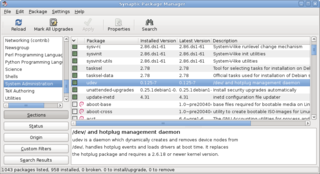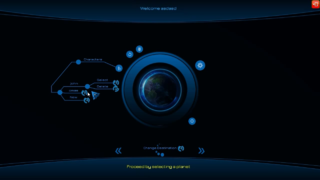External links
| Software |
| |||||||
|---|---|---|---|---|---|---|---|---|
| Technologies | ||||||||
| Web services | ||||||||
| Acquisitions | ||||||||
| People | ||||||||
| This computer-library-related article is a stub. You can help Wikipedia by expanding it. |
Adobe Source Libraries are a set of libraries initially developed by Adobe for internal use and later made open source.
These libraries provide functionality to specify a GUI's definition and behavior. They are organized around the two main modules Adam and Eve.
| This computer-library-related article is a stub. You can help Wikipedia by expanding it. |

The OSGi Alliance, formerly known as the Open Services Gateway initiative, is an open standards organization founded in March 1999 that originally specified and continues to maintain the OSGi standard.
The Portable Document Format (PDF) is a file format developed by Adobe in the 1990s to present documents, including text formatting and images, in a manner independent of application software, hardware, and operating systems. Based on the PostScript language, each PDF file encapsulates a complete description of a fixed-layout flat document, including the text, fonts, vector graphics, raster images and other information needed to display it. PDF was standardized as ISO 32000 in 2008, and no longer requires any royalties for its implementation.
PostScript (PS) is a page description language in the electronic publishing and desktop publishing business. It is a dynamically typed, concatenative programming language and was created at Adobe Systems by John Warnock, Charles Geschke, Doug Brotz, Ed Taft and Bill Paxton from 1982 to 1984.

A package manager or package-management system is a collection of software tools that automates the process of installing, upgrading, configuring, and removing computer programs for a computer's operating system in a consistent manner.
Carbon is one of Apple’s C-based application programming interfaces (APIs) for macOS, the operating system that powers Macintosh computers. Carbon provided a good degree of backward compatibility for programs that ran on Mac OS 8 and 9. Developers could use the Carbon APIs to port their “classic” Mac software to the Mac OS X platform with little effort, compared to porting the app to the entirely different Cocoa system, which originated in OPENSTEP.
A graphical user interface builder, also known as GUI designer, is a software development tool that simplifies the creation of GUIs by allowing the designer to arrange graphical control elements using a drag-and-drop WYSIWYG editor. Without a GUI builder, a GUI must be built by manually specifying each widget's parameters in source-code, with no visual feedback until the program is run.
Harbour is a computer programming language, primarily used to create database/business programs. It is a modernized, open sourced and cross-platform version of the older Clipper system, which in turn developed from the dBase database market of the 1980s and 1990s.

The Extensible Metadata Platform (XMP) is an ISO standard, originally created by Adobe Systems Inc., for the creation, processing and interchange of standardized and custom metadata for digital documents and data sets.
Ngspice is a mixed-level/mixed-signal electronic circuit simulator. It is a successor of the latest stable release of Berkeley SPICE, version 3f.5, which was released in 1993. A small group of maintainers and the user community contribute to the ngspice project by providing new features, enhancements and bug fixes.

Adobe AIR is a cross-platform runtime system developed by Adobe Systems for building desktop applications and mobile applications, programmed using Adobe Animate, ActionScript and optionally Apache Flex. The runtime supports installable applications on Windows, OS X and mobile operating systems including Android, iOS and BlackBerry Tablet OS. It also originally ran on Linux, but support was discontinued as of version 2.6 in 2011.

Crazy Eddie's GUI (CEGUI) is a graphical user interface (GUI) library for the programming language C++. It was designed for the needs of video games, but is usable for non-game tasks, such as applications and tools. It is designed for user flexibility in look-and-feel, and to be adaptable to the user's choice in tools and operating systems.

CamStudio is an open-source screencasting program for Microsoft Windows released as free software. The software renders videos in an AVI format. It can also convert these AVIs into Flash Video format, embedded in SWF files. CamStudio is written in C++, but CamStudio 3 will be developed in C#. The program has distributed malware and harmful viruses via the installer.
Adobe Flash Catalyst is a designers' tool for creating the user interface for Rich Internet Applications.
A scripting or script language is a programming language for a special run-time environment that automates the execution of tasks; the tasks could alternatively be executed one-by-one by a human operator. Scripting languages are often interpreted, rather than compiled.

ColdBox is an open-source, conventions-based, modular web application framework intended for building enterprise applications with CFML using a Hierarchical MVC approach. ColdBox uses Convention over configuration and aims for simplicity, rapid development. It makes use of Model-view-controller, Dependency injection, Unit testing, Aspect-oriented programming architectural patterns. ColdBox allows for development of stand-alone modules which can be shared across apps. ColdBox is an active and heavily documented CFML framework.

mpv is media player software, based on MPlayer and mplayer2. It is free and open-source software released under a mix of licenses including GNU General Public License version 2 or later (GPLv2+), with parts under GNU Lesser Public License version 2.1 or later (LGPLv2.1+), and some optional parts under GNU General Public License version 3 (GPLv3).
Integra Live is open-source software for interactive sound design developed and maintained by the Integra Lab at Birmingham Conservatoire, part of Birmingham City University. The software takes an audio input either from the computer's audio interface or from an audio file, and allows various types of audio transformation to be applied. The software can be used in live performance as well as in creating new sounds or composing new music in a studio. Integra Live was originally designed to address problems of software usability in the creation and performance of live electronic music. Integra Live is supported on PC computers running the Microsoft Windows operating system and on Apple computers running OS X.